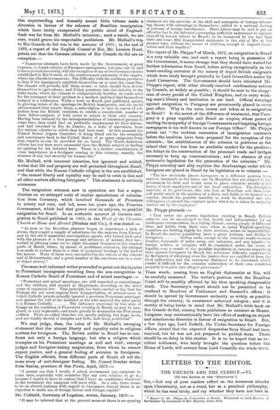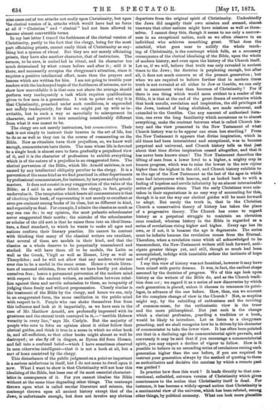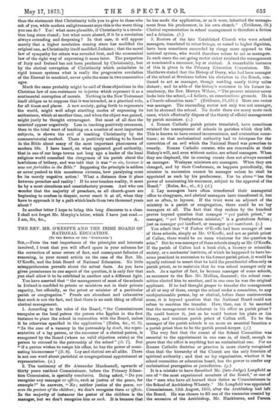LETTERS TO THE EDITOR.
THE CHURCH AND THE CLERGY.—VI.
[TO THIS EDITOS OF THS "SPECTATOR:1 SIR,—Let any of your readers reflect on the numerous attacks upon Christianity, not as a creed, but as a practical philosophy, which he has read lately, and say whether they have not been in ' Report by Mr. Phipps on b'miyr•ation to Brazil. Presented to both Houses of Parliament by command of Her Majesty, June, 1872.
nine cases out:of ten attacks not really upon Christianity, but upon the clerical version of it, attacks which would have had no force at all if " Christian " and " clerical" had not been allowed to become almost convertible terms.
In my last letter I traced the feebleness of the clerical version of Christianity, partly to the fact that the clergy, being for the most part officiating priests, cannot easily think of Christianity as any- thing but a system of ritual. But they are not merely officiating priests, they have also another character, that of instructors. The sermon, to be sure, is embedded in • ritual, and its character too much determined by what comes before and after it ; still it is there, and necessarily occupies the clergyman's attention, since it requires a positive intellectual effort, more than the prayers and lessons which are written for him. I am not going to trouble your readers with the hackneyed topic of the feebleness of sermons, nor to show how unavoidable it is that men not above the average should perform very inadequately a task which requires qualifications given to few men in a generation. I wish to point out why it is that Christianity, preached under such conditions, is expounded not merely inadequately, for that we might put up with as in- evitable, but in such a way as materially to misrepresent its character, and pervert it into something considerably different from what it was meant to be.
The clergy are not merely instructors, but commentators. Their task is not simply to instruct their hearers in the art of life, but to do so as well as they can in the course of commenting on the Bible. Now as ritualists have their prejudices, so, we know well enough, commentators have theirs. The man whose life is devoted to a single book is almost sure to form gradually a prejudiced view of it, and it is the character of professions to exhibit everything which is of the nature of a prejudice in an exaggerated form. The clerical perversion of the Bible, which Mr. Arnold satirises, is not caused by any intellectual obliquity peculiar to the clergy. It is a perversion of the same kind as we find practised in other departments by professional commentators, for instance, by lawyers and by school- masters. It does not consist in any exaggeration of the value of the Bible; as I said iu an earlier letter, the clergy, in fact, greatly undervalue it. The temptation which besets all commentators is that of idealising their book, of representing it not merely as excellent or even pre-eminent among books of its class, but as different in kind, and especially as final. For example, I admire the classics as much as any one can do ; in my opinion, the most pedantic schoolmaster never exaggerated their merits ; the mistake of the schoolmaster or scholar of the old sort is that he raises them into an ideal litera- ture, a fixed standard, to which he wants to make all ages and nations conform their literary practice. He cannot be content with thinking that many of the classical writers are excellent, that several of them are models in their kind, and that the classics as a whole deserve to be perpetually remembered and studied. He will have them all to be models, the Latin as well as the Greek, Virgil as well as Homer, Liu as well as Thucydides ; and he will not allow that any modern writer can ever rise to be a model in the same sense. Hence a whole litera- ture of unsound criticism, from which we have hardly yet shaken ourselves free ; hence a permanent perversion of the modern mind with respect to the ancient writers, an oscillation between rebel- lion against them and servile submission to them, an incapacity of judging them freely and without prepossession. Closely similar is the treatment of the Bible by the clergy, and hence we see, only in an exaggerated form, the same oscillation in the public mind with respect to it. People who can shake themselves free from this influence and look at it impartially, as we have seen in the case of Mr. Matthew Arnold, are profoundly impressed with its greatness and the eternal truth conveyed in it,—" terrible Hebrew veracity in every line," says Mr. Carlyle. But the majority of people who care to foim an opinion about it either follow their clerical guides, and think it true in a sense in which no other book is, and all-sufficient, so that other books might almost as well be destroyed ; or else fly off in disgust, as Byron did from Horace, and fall into a confused belief—which I have sometimes observed in men otherwise intelligent—that it is not a book at all, but a sort of hoax contrived by the clergy.
This disturbance of the public judgment on a point so important is a serious misfortune in itself, but I do not mean to dwell upon it now. What I want to show is that Christianity will not bear this idealising of the Bible, but loses one of its most essential character- istics in consequence of it. For you cannot idealise the Bible without at the same time degrading other things. The contempt thrown upon what is called secular literature and science, the contempt thrown upon all ancient history except that of the Jews, is unfortunate enough, but does not involve any obvious departure from the original spirit of Christianity. Undoubtedly the Jews did magnify their own mission and seemed, almost unaware that other nations might have missions as well as them- selves. I cannot deny this, though it seems to me only a narrow- ness in an exceptional nation, such as we often observe in an individual who achieves something great. What does the mischief, what goes near to nullify the whole teach- ing of Christianity, is the contempt which falls, as a necessary consequence of the clerical idealising of the Bible, upon the whole of modern history, and even upon the history of the Church itself. Let us, if we will, believe that truth was only revealed in ancient times to the Jews ; the doctrine is perplexing enough, but after all, it does not much concern us of the present.generation ; but when we are required to believe further that in modern times truth is not revealed at all either to Jew or Gentile, we can only ask in amazement what then becomes of Christianity ? For if there is one thing which would seem evident to a reader of the-
Bible, it is that at the end of the great drama of centuries which that book unrolls, revelation and inspiration, the old privileges of the Jews, 'instead of being abolished, are made universal, and extended to the Gentiles. Can any amount of authorised itera- tion, can even the long familiarity which accustoms us to almost everything, make the contrast between what is called Church his- tory and the view presented in the New Testament of what Church history was to be appear one atom less startling ? From the New Testament it appears that divine inspiration, which in old times had been intermittent and exceptional, was to become- perpetual and universal, and Church history tells us that just about that time divine inspiration ceased altogether, and that it has never been known since! The New Testament describes the- lifting of men from a lower level to a higher, a mighty step in human progress, which was to raise the lowest in the new regime• higher than the highest in the old, and Church history exhibits to us the age of the New Testament as the last of the ages in which man had intercourse with heaven, and as looked back to with a feeling of hopeless and servile inferiority by an almost interminable- series of generations since. That the early Christians were mis- taken in their expectations is an easy way of accounting for this, though it is not the way our clerical guides will be most forward to adopt. But surely the truth is, that in the Christian Church a conservative theory of history has taken the place- of a progressive theory. The Church has come to regard history as a perpetual struggle to maintain an elevation once reached, whereas history in the Bible is regarded as a series of revelations rising higher and higher. Every age has its• own, or if not, it is because the age is degenerate. The series must be infinite because the revelation comes from the Eternal. Therefore, when a revelation came which all acknowledged to be transcendant, the New-Testament writers still look forward, anti- cipate greater things yet, and still, though so much had been accomplished, indulge with insatiable ardour the instincts of hope- and of prophecy.
I say this view of history was not fanatical, however it may have- been mixed with poetic dreams. It was, in fact, the earliest shape- assumed by the doctrine of progress. We of this age look upon history as the writers of the Bible do, and as the Church tradi- tion does not ; we regard it as a series of new discoveries by which each generation is placed, unless it chooses to renounce its privi- leges, in advance of the one before. How, then, can we account for the complete change of view in the Church ? Not, as sceptics. might say, by the subsiding of enthusiasm and the reviving of common-sense, for the enthusiastic view is the truer and the more philosophical. But just such is the change which a clerical profession, guarding a tradition or a book, would be likely to introduce. Let us listen to a clergyman preaching, and we shall recognise how he is driven by his character of commentator to take the lower view. It has often been pointed out that in a declining age the commentatorial spirit prevails, and conversely it may be said that if you encourage a commentatorial spirit, you may expect a decline of vigour to follow. How is it possible to believe in an ascending series of revelations raising each generation higher than the one before, if you are required to instruct your generation always by the method of quoting to them as authoritative and decisive the maxims by which a remote past was guided ?
In practice how does this work ? It leads directly to that con- ventional, enfeebled, outworn version of Christianity which gives countenance to the notion that Christianity itself is dead. For instance, it has become a widely-spread notion that Christianity is a sentimental view of the universe, which has been refuted, among other things, by political economy. What can look more plausible than the statement that Christianity tells you to give to those who ask of you, while modern enlightenment says this is the worst thing you can do ? Yes ! what more plausible, if Christianity is a revela- tion long since closed ; but what more absurd, if it be a revelation always extending and deepening ? In that case, it will appear merely that a higher revelation coming since has modified the original one, as Christianity itself modified Judaism ; that the moral law of sympathy for others was revealed first, and the economical law of the right way of expressing it came later. The pauperism of Italy and Ireland has not been produced by Christianity, but by the clerical corruption of Christianity which assimilates to rigid human systems what is really the progressive revelation of the Eternal to mankind, never quite the same in two consecutive ages.
Much the same probably might be said of those objections to the Christian law of non-resistance to injuries which represent it as a sentimental corruption of morals. Nothing in the New Testament itself obliges us to suppose that it was intended, as a practical rule, for all times and places. A new society, going forth to regenerate the world, might well adopt startling modes of expressing its enthusiasm, which at another time, and when the object was gained, might justly be thought extravagant. But most of all does the mischief appear negatively. Less in teaching positively erroneous, than in the total want of teaching on a number of most important subjects, is shown the evil of teaching Christianity by the commentatorial method. There is positively nothing to be found in the Bible about many of the most important phenomena of modern life. I have heard, on what appeared good authority, that in one of our large towns not long ago a leader of the local religious world consulted the clergyman of his parish about the lawfulness of bribery, and was told that it was "no sin, because it was not forbidden in the Bible." Supposing the principle is seldom or never pushed to this monstrous extreme, how paralysing must be its merely negative action ! What a distance does it place between preacher and reality ! If he ever touches reality, it must be by a most circuitous and unsatisfactory process. And who can wonder that the majority of preachers, as all church-goers are beginning to confess in despair, never reach it at all, when they have to approach it by a path which leads them two thousand years about ?
In another letter I hope to bring this long discourse to a close.
I shall not forget Mr. Murphy's letter, which I have just read.—




































 Previous page
Previous page